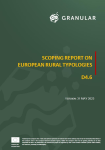Stjernberg M., Norlen G., Vasilevskaya A., Tapia C., Berchoux T. (2023). Scoping report on European rural typologies. 72 p. Deliverable: D4.6. GRANULAR – Giving Rural Actors Novel data and re-Useable tools to Lead public Action in Rural areas (Grant agreement ID: 101061068).
https://doi.org/10.5281/zenodo.10818621
https://doi.org/10.5281/zenodo.10818621
| Titre : | Scoping report on European rural typologies |
| Auteurs : | M. Stjernberg ; G. Norlen ; A. Vasilevskaya ; C. Tapia ; T. Berchoux |
| Type de document : | Rapport, Expertise, Working Paper |
| Année de publication : | 2023 |
| Format : | 72 p. |
| Note générale : | Deliverable: D4.6. GRANULAR – Giving Rural Actors Novel data and re-Useable tools to Lead public Action in Rural areas (Grant agreement ID: 101061068) |
| Langues : | Anglais |
| Langues du résumé : | Anglais |
| Catégories : |
Catégories principales 04 - DEVELOPPEMENT LOCAL ET REGIONAL ; 4.1 - Territoire (généralités). Economie Régionale et Spatiale. Aménagement du TerritoireThésaurus IAMM CLASSIFICATION ; ZONE RURALE ; MILIEU RURAL ; TERRITOIRE ; METHODE ; EUROPE |
| Mots-clés: | DIVERSITÉ RURALE |
| Résumé : | This report examines different territorial typologies for classifying rural areas in Europe. The report is part of Task 4.6 (Characterising rural diversity) in WP4 (Development of tools and indicators to characterise rural diversity) in the GRANULAR project. The overall objective of Task 4.6 is to develop a multi-criteria territorial typology for the EU rural areas that is aligned with key policy priorities. This work is based on the premise that there is a need for a more nuanced understanding of the diversity of rural areas and the interlinkages within the rural-urban continuum in Europe. The purpose of this report is to provide an inventory of existing territorial typologies and a comparative assessment of these typologies focusing on questions such as: i) how they are used for analytical purposes and for supporting policy work; ii) how they are constructed; and iii) the main strengths and weaknesses of the different typologies and approaches. The focus is on two main types of typologies, namely European-wide typology frameworks for delimiting rural areas, and national, regional, and local typologies that exist in different European countries. |
| Cote : | Online |
| URL / DOI : | https://doi.org/10.5281/zenodo.10818621 |
Documents numériques (1)
PRO51530.pdf Adobe Acrobat PDF |







